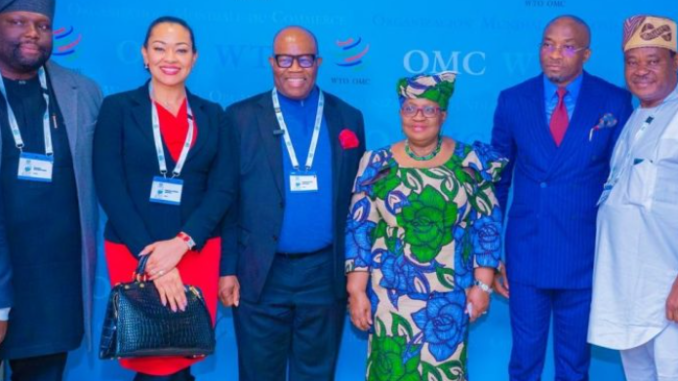
In order to seize opportunities in the digital and maritime economies, the National Assembly of Nigeria (NASS) is pursuing a cooperative cooperation with the World Trade Organization (WTO). Nigeria, a country with a young population and a developing tech industry, is aware of the digital economy’s enormous potential to spur innovation, provide employment, and accelerate global economic expansion. With its vast experience in promoting global commerce, the WTO can offer NASS invaluable advice and assistance in this undertaking.
This report examines the main areas of concentration and the possible advantages of this collaboration, such as:
Digital trade facilitation is the process of creating a digital trade gateway that makes trade rules and information easily accessible.
Encouraging Women in Trade: Making sure female business owners may take advantage of WTO initiatives to expand.
Fighting illicit Fishing: Creating regulations to deal with the illicit fishing activities in the coastal areas of Nigeria.
Encouraging sustainable methods to support a vibrant marine economy is known as sustainable marine resource management.
Exposing the Digital Terrain

The global trade is changing due to the digital revolution. The enormous potential of the digital economy for Nigeria’s development is acknowledged by NASS. Working together with the WTO can yield helpful advice in:
Exposing the Digital Terrain
The global trade is changing due to the digital revolution. The enormous potential of the digital economy for Nigeria’s development is acknowledged by NASS. Working together with the WTO can yield helpful advice in:
Creating Efficient Regulations: Creating equitable and transparent rules for online sales and the production of digital material.
Assisting in the construction of digital infrastructure will enable Nigerians to take part in the digital economy and close the digital divide.
Using the Resources Found in Our Seas
Nigeria is home to a thriving and varied marine environment. The NASS-WTO collaboration can concentrate on:
Enforcing laws to stop illicit fishing and encourage ethical fishing methods is known as sustainable fisheries management.
Development of the “Blue Economy”: Examining prospects in aquaculture, marine renewable energy, and environmentally friendly travel to establish a flourishing “blue economy.”
A Partnership That Benefits Both Parties
There are benefits to both parties involved in this relationship. In order to create policies that work, NASS can leverage the WTO’s resources and experience, and the WTO is better prepared to support inclusive and sustainable trade practices in the biggest economy in Africa.
Prospecting: An Appeal for Intervention
This partnership’s effectiveness depends on honest communication, teamwork, and a dedication to common objectives. Together, NASS and the WTO can enable Nigeria to fully realize the potential of the maritime and digital industries, resulting in wealth and sustainable growth for the country’s people.
In summary
Nigeria’s digital and maritime economy could reach new heights thanks to the WTO-NASS alliance. Through innovation, ethical commerce, and environmental sustainability, our partnership can open doors to a more promising economic future for all Nigerians.

Be the first to comment